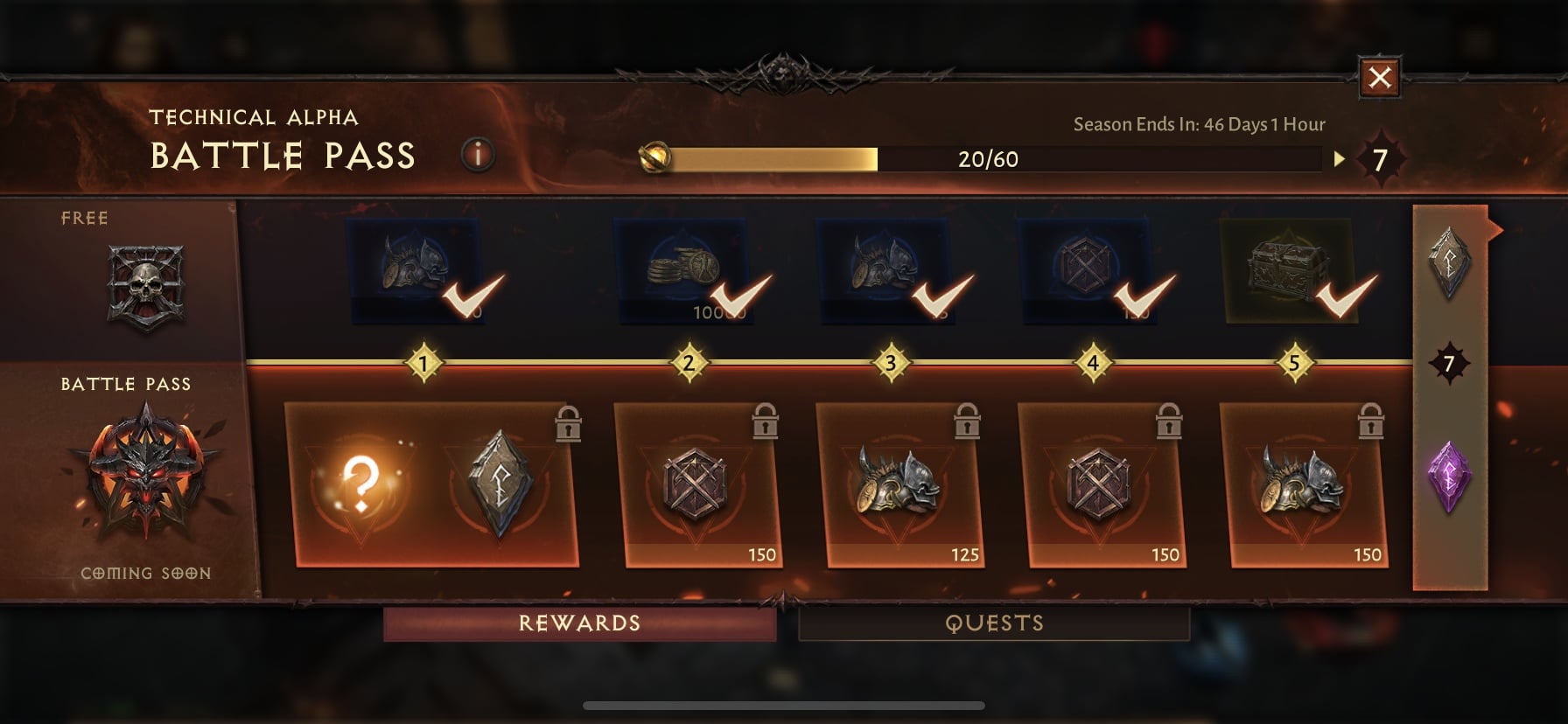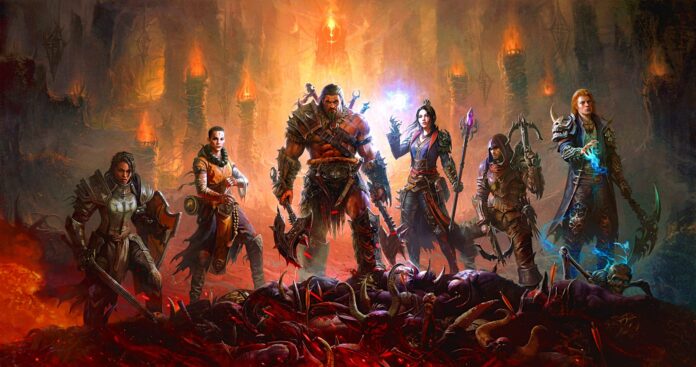What is really Free2Play and where does it get expensive? We shed light on the payment model and the Pay2Win allegations for Diablo Immortal.
Diablo Immortal wants to bring the gameplay of the hack-and-slay role-playing game to smartphones, but is now surprisingly also being released for PC. As a Free2Play game, it relies on microtransactions for its funding. This raises the question: How much of the game is really free? We summarise all the information for you so far.
Free2Play: What is free in Diablo Immortal?
Those who don’t spend money on Diablo Immortal should still get a complete package. Blizzard highlights that even as a Free2Play player, you will get free access to all content of the title. This includes:
- All classes: You can use all classes without restriction.
- Story: You should be able to experience the complete story of the game without using real money.
- Game World: Free2Play users will have access to all areas of Diablo Immortal.
- Equipment: All of your equipment can be found in-game. There is no loot offered in the shop.
- Battle Pass: Diablo Immortal will have a Battle Pass. It’s also available in a free version.
No energy system: In games such as Genshin Impact you have to pay a special resource to play certain content. This only regenerates passively or through the use of real money. Blizzard clearly states that there will be no such system in Diablo Immortal. You can play as long as you have time.
Is Diablo Immortal still Pay2Win?
According to Blizzard, the microtransactions will be completely optional and are not necessary to progress in the game. They also claim that they will not affect the core gameplay of the title Among other things, you will be able to spend money on the following items:
- Eternal Orbs: This is the game’s premium currency, which you purchase for real money and use to pay for the rest of the shop offerings.
- Platinum: The second currency in the game can either be earned or bought with orbs. It is essential for crafting legendary gems (more on this in a moment), removing skill stones from talismans and trading in the auction house.
- Legendary Crests: Increase your rewards from the randomly generated Elder Rift dungeons and are the only way to guarantee the payout of runes and legendary gems. They also change the gameplay of the dungeons through random modifiers such as monsters exploding on death or a lower cooldown for your skills. Crests apply to the entire party.
- Reforge Stones: There are specialised Reforge Stones in the shop that make it easier to forge a desired value on your equipment. They thus reduce the randomness of the free normal Reforge Stones, but do not remove it completely.
- Battle Pass: If you pay for the Battle Pass, you get additional rewards. But again, there is no equipment. Instead, the Battle Pass unlocks more crests, gems and materials that you can use to upgrade equipment.
- Cosmetic Items: In the closed beta, a myriad of cosmetic armour sets are already available for each class to help customise your character. You can see examples of necromancers here
In addition, a monthly “blessing” can be purchased without a Battle Pass, which gives you rare emblems, 300 orbs and additional trading and storage space. Items can also be “awakened” with the help of a one-time payment and thus receive an additional effect that reduces the cooldown of some abilities by 10 percent, for example.
With their payment models, mobile titles currently dominate the current games industry.
Table of Contents
How exactly does the Battle Pass work?
The Battle Pass of Diablo Immortal works like the one from most games. It can therefore be compared to an experience point system. By completing activities, such as a Rift, you earn Battle Points. If you accumulate enough of them, you will rise by one of a total of forty ranks in the Battle Pass and receive a reward for it, or – in the case that you own the paid version – several.
The Battle Pass will also be available in a premium version that will catapult you directly to level 12. The rewards can include crafting materials, gold, honour, reforging stones, blessings, emblems and battle chests, as well as the legendary gems that are extremely important for the endgame, but not their best versions.

What are Legendary Gems?
The Legendary Gems are the lynchpin of the Pay2Win accusations against Diablo Immortal so far. They can also be earned without real money, but this involves considerable effort. Some Youtubers estimate the Free2Play path to the best equipment at 40 years of life.
In contrast, they estimate a monetary investment in the shop of between 50,000 and 75,000 euros, because even with real money you can’t acquire the valuable items directly. Instead, you merely buy a drop guarantee for the Elden Rift raids, which last about five minutes.
In contrast to the Battle Pass, this guarantee includes not only legendary gems of rarity levels 1 and 2, but also those of the coveted third level with the five stars. Each of these can also be levelled up by ten ranks, for which you need the dust of decomposed legendary gems. Exactly which rarity you receive, however, is still left to chance.
In total, you can socket six legendary gems in your armour and, in extreme cases, increase your damage and health by 300 percent, as Youtuber Gregg2G explains in this video and proves with comparison images:
The shop offer may still change completely
Blizzard itself is still keeping a low profile on the exact shop repertoire for the soft release on 02 June 2022 and it is quite possible that the current reactions could still cause a rethink. We will of course keep you up to date on this.
Those who only want to enjoy the PvE aspect of the game alone or with friends should be able to do so regardless of the possible shop offer. Only the PvP aspect becomes a potential problem child in view of the feared widening gap between Free2Play players and real-money payers.
All further information on the game can be found in our handy overview:
Diablo Immortal: Requirements for PC, Android, iOS and the most important differences
How expensive will the microtransactions be?
The last known price for Eternal Orbs ranged between 1.5 and 1.8 cents per Orb. The largest package contained 7,200 orbs for 110 euros. For a Legendary Crest (i.e. drop guarantee), up to 300 Orbs were due and three could be activated at the same time for a raid.
If you wanted to unlock such a crest with earned platinum, you had to raise 3,000 pieces of the silvery currency and were limited to one crest per day. The orb equivalent of that much platinum was unsurprisingly 300 orbs (just over 5 euros).
The Battle Pass in the beta cost either €5.49 for the basic or €16.99 for the premium variant. The monthly blessing also cost 5.49 euros and the “revival” of an item 10 euros.
In addition to a daily free gift box containing some crafting material and 5,000 gold, there were also something like loot boxes that went over the virtual hell counter for about one euro. For example, 60 Eternal Orbs, two rare emblems, one Legendary Emblem and six normal gems came out of the Forgotten Tower Chest.
The next opportunity to take a look at the shop will probably be at the beta launch on 2 June, which will also be a soft launch for the PC, as all progress will be permanently preserved. You can find all the information here:
Diablo Immortal: Release date and PC version announced in livestream
Smartphone games without microtransactions
Microtransactions are almost a given in smartphone games these days. However, some developers show that it can be done differently, and even slightly more expensive full-price games can do well on mobile phones. You can find examples of this in our list of 46 games that were once released on the PC but are now also available for Android and iOS.
What do you think about the monetisation of Diablo Immortal? Are you worried by the information so far, or are you confident that the shop offer won’t get in the way of your PvE carnage? Let us know in the comments


